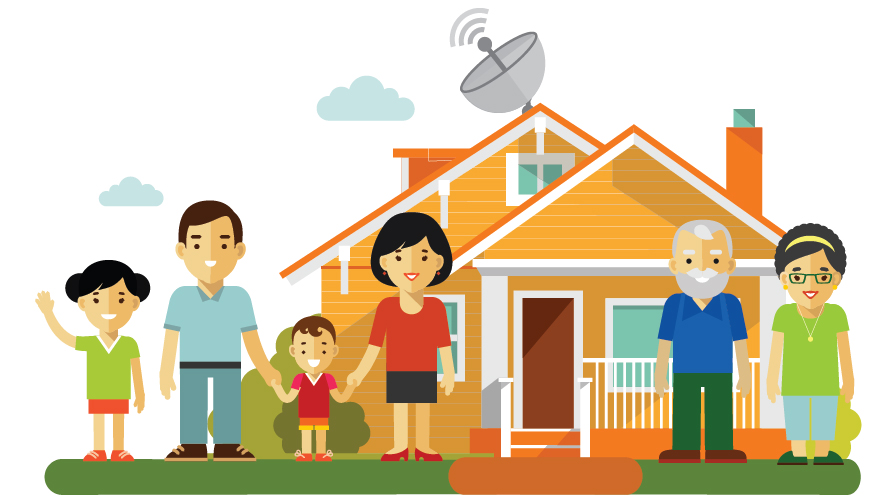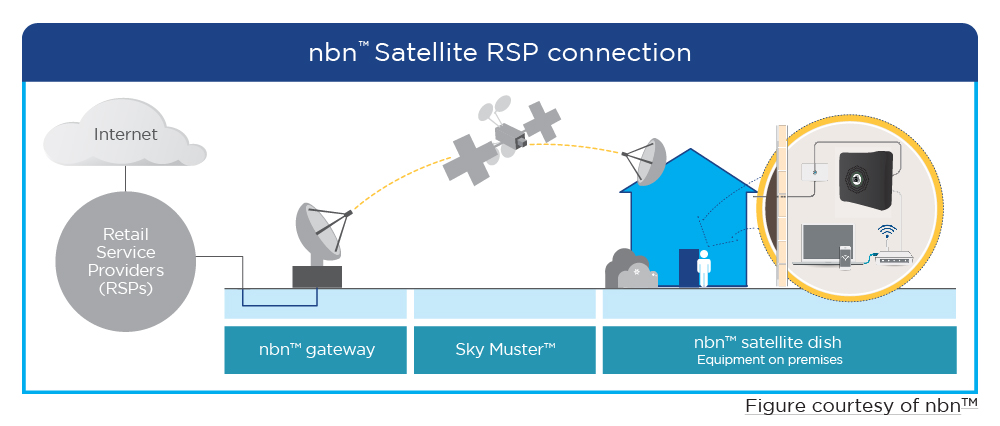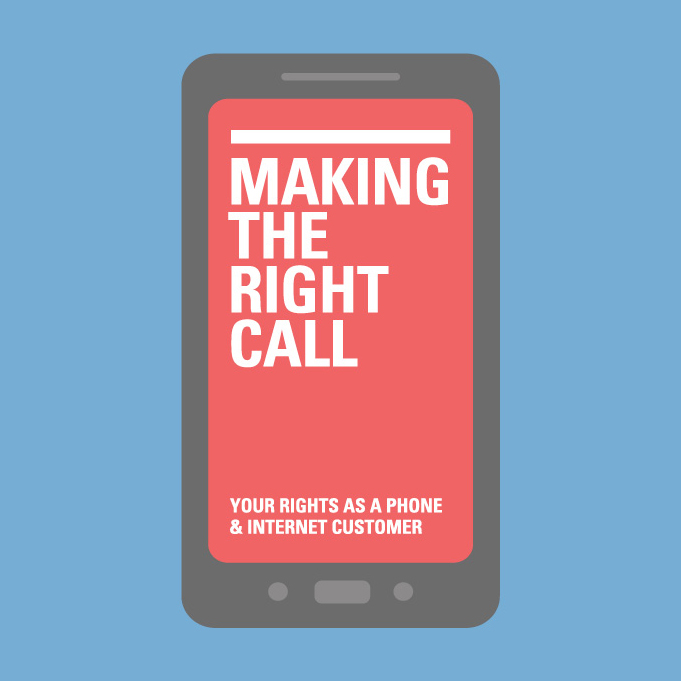Our focus
- Details
- Broadband

Sky Muster (or nbn’s Long Term Satellite Service) will provide fast broadband coverage to three per cent (or around 400,000) of homes and small businesses across regional and remote Australia and its islands.
Am I eligible for services?
Eligibility to obtain these services can be checked on the nbn website.
Consumers currently using satellite services (such as Interim Satellite Service (ISS), Australian Broadband Guarantee (ABG) or National Satellite Scheme (NSS)) will be able to switch to the Sky Muster service (some consumers may receive other technology such as Fixed Wireless). See ‘Switching from another satellite service’ for more details.
What if my address is not on the nbn website but I think it should be?
You should contact a Retail Service Provider (RSP) and discuss your eligibility with them.
How do satellite broadband services work?
The Sky Muster satellites will provide a connection between customer houses and RSPs. When you request to access information from your house, the request is sent from your satellite dish to the satellite 35,786kms above the equator. The signal then travels to one of nbn’s ground stations which connect to your RSP and finally the internet. Information is then sent back to your device in the reverse direction.
To find out more information on what to expect from Sky Muster services see ‘What to expect from a Sky Muster broadband service’.

How do I order a service?
Services can be ordered now. To get connected:
- Check if you are eligible (nbn website)
- Choose a retail service provider (see ‘Choosing a retail service provider’) and plan that suits your needs (see ‘Choosing a plan that suits your needs’)
- Get Connected (see 'Getting Connected' for more information).
What services will work over Sky Muster?
Broadband services will work over Sky Muster.
You may be offered other services, such as phone services (called VoIP). See ‘Voice services’ for more details.
Existing phone and internet services delivered over copper, radio and wireless technologies will continue to be offered and you can keep these services.
IMPORTANT QUESTIONS TO CONSIDER AND ASK YOUR PROVIDER
- Can I use all my current services with this plan?
- How long will it take to get connected?
- What do I need to do to prepare my property for connection?
- Will my other satellite equipment be uninstalled at the same time?
- When will the billing start?
- What speed level will I get on average with this plan during peak and off peak hours?
- Apart from the monthly charge, what other fees do I need to pay?
- Do I need to purchase a new router?
- Can I get VoIP services? Is the router set to ensure quality voice services?
- How do I access my data tracking service?
- Will there be any additional charges for connecting or fault repairs?
- Is my property a standard installation? Can I cancel the service, without charge, if I am not a standard installation?
- Do you offer service guarantees for fault rectification and outages?
Will nbn be offering services for children’s education and community use?
Yes. Internet plans are available for distance education children. See ‘Remote and Isolated Communities and Distance Education’ for more information.
What do I do if something goes wrong?
You should contact your RSP if something goes wrong. See 'Interruptions, faults and repairs' for further information on what to do if something goes wrong and 'Who to contact, complaints and further information for contact details.
I am due to get satellite, but I would rather have fixed wireless. What are my options for alternative nbn networks?
If you wish to consider an alternative technology other than satellite, nbn offers a ‘technology choice’ program. There are two possibilities. The first is area switch. This is where a number of properties in an area collectively pay to receive a different technology. The second is individual switch, where one property pays to switch technology.
Both of these options can cost a significant amount of money. Costs range from a few hundred thousand dollars to millions of dollars, depending on the complexity and size of the switch required.
- Details
- Broadband

Sky Muster satellites were purpose-built to provide a fast broadband connection to Australian homes and businesses, so it is expected to perform to a higher standard than previous satellite services.
With Sky Muster services you will be able to take advantage of a broader range of services available over the internet, such as listening to radio, data voice calls (called Voice over IP or VoIP), tele-health and streaming movies as well as checking email, browsing the internet, banking online, and accessing government websites.
Note: Care must be taken with activities requiring high levels of data to ensure usage caps are not exceeded.
Are there things I will not be able to do?
Due to the distance of the satellite, services which require instant communication may not be as responsive as an earth based network. This time delay is called latency. Activities such as voice calls and online auctions may be affected.
Will Sky Muster work during all weather conditions?
Sky Muster, like all satellite services, is affected by weather conditions. The weather at your house and at the ground station, such as rain, storms, cloud cover and dust may all affect services. nbn has specially designed the dishes to adapt to different circumstances, such as storms. However, you might experience lower performance levels during some weather conditions and there may be periods where the service does not work.
You should be aware of this if Sky Muster is your only source of communication. Alternative options should be considered in cases of emergencies.
Will speeds and performance on Sky Muster be better than previous services?
It is expected that services will perform better and be more reliable. Sky Muster is offering two speed levels: up to 12/1Mbps and 25/5Mbps. This is faster than current satellite services, which offer up to 6Mbps.
- Details
- Broadband
What to do you if cannot get a broadband service while waiting for nbn to reach you
With the NBN officially completing its rollout in December 2020, most Australians should be on their way from switching out of ADSL connections.
However, if you're one of the few Aussies still using ADSL, there are still options for you.
Read our six helpful steps if you can't get a broadband service. You can compare the ADSL plans still on the market on sites such as WhistleOut and Finder.
The Government has committed to providing superfast broadband to all premises in Australia.
Broadband is a fast, always-on way of linking your premises to the internet and other services (such as videoconferencing, security monitoring and health monitoring services). Superfast broadband is capable of achieving 25Mbps and greater speeds.
To deliver superfast broadband to all premises the Government has created a company called the National Broadband Network (nbn) to modernise broadband infrastructure across Australia. In certain areas other companies may also provide this new infrastructure.
What services will this change affect?
Many services and equipment use telecommunications infrastructure, such as phone and voice service, internet, fax, medical alarms, security alarms, EFTPOS machines and elevator phones. These services and equipment may be affected.
Most voice services in Australia will be delivered over superfast broadband (called a VoIP service). Services will be of similar quality to the current technology.
Consumers in the satellite and fixed wireless areas will continue to have access to their current copper based voice services.
What are the benefits?
Providing all premises with superfast broadband will have two key benefits:
1. ACCESS
nbn will improve access and performance of broadband services across Australia, which has been very mixed. The Government initiative to provide superfast broadband to all premises will improve everyone’s access to and experience of broadband.
2. CHOICE
Currently many consumers can only access services from one provider.
As part of the initiative, the Government is aiming to increase competition between retail service providers (RSP's – i.e. Telstra, Optus, TPG, iiNet).
What infrastructure is being used?
nbn and the other infrastructure providers can determine which technology they will use once they meet the superfast broadband criteria (capable of delivering 25Mbps)
There are a range of technologies that can deliver superfast broadband. Premises will be connected through one of three technologies:
- Fixed line technologies (such as Fibre optic cabling, Hybrid Fibre Coaxial (HFC), Very-high-bit-rate Digital Subscriber Line (VDSL), Fibre to the Node (FTTN), Fibre to the distribution point (FTTdp), Fibre to the Basement (FTTB))
- Fixed wireless technologies, or
- Satellite technologies
Who will supply superfast broadband to my premises?
For the vast majority of premises nbn will be upgrading and supplying the superfast infrastructure.
Some premises, especially in new or Greenfield developments, might have their superfast infrastructure supplied by another provider.
How to find out when you will get connected
Please check the nbn website to see how and when your premises will be supplied with a superfast broadband connection.
If your premises is in a new development; check the ‘New Development map' to see who is providing the infrastructure.
Modernising the broadband infrastructure across Australia is a difficult task that will take a number of years to complete. It is expected that all premises will be served by superfast broadband infrastructure by 2021.
For further information and advice on how to connect, how to choose a plan, and what to do if there is a problem continue reading.
Note: you should always check for current information with your service provider when making decisions about phone or broadband services.
- Details
- News: Covid19

During the COVID-19 pandemic, continuing social distancing and self-isolation efforts have resulted in millions of Australians increasingly relying on their phone and home broadband services.
ACCAN has pulled together the telco information you need to know on:
Unfortunately, some Australians are at risk of being left behind because they are unable to afford a home broadband service. As this becomes the main way that people can study, work, and access telehealth services from home – this is simply not acceptable. ACCAN is calling for affordable home broadband to be prioritised now.
A coalition of nearly 30 community sector organisations and advocates has urged the Federal Government to address the affordability of communications services and equipment to support Australians in need during the COVID-19 pandemic.
Community Sector Organisations Call on Government to Act on Communications Affordability Issues
Find out more on
#NoAustralianLeftOffline
To help communications consumers understand the latest updates from the telco sector and how consumers may be affected, ACCAN will updating our live blogs with new developments as they occur.
Read more: COVID-19: Telco Services and Technology
Write comment (0 Comments)- Details
- News: Covid19
The COVID-19 pandemic and its associated restrictions, both domestically and internationally, had an impact on telco customer service arrangements. For example, some telcos had to close some of their stores during COVID-19 restrictions, and extended wait times were more likely when contacting telco customer support teams via phone or instant chat. Telcos asked customers to use self-service channels (such as the My Optus app, the Telstra 24x7 app, or MyVodafone) to trouble-shoot their issues where possible.
Read more: Changes to Customer Service Arrangements
Write comment (0 Comments)- Details
- News: Covid19
 Where do I go for help?
Where do I go for help?
Disability Gateway: COVID-19
People with disability can contact the Disability Gateway to get free, fact-checked and private information and advice about COVID-19. They can also be referred to other support services if needed, including counselling and advocacy. The Disability Gateway can help families, carers and support workers, too.
To use the Disability Gateway, go to Disability Gateway or call 1800 643 787. The Disability Gateway phone line is available Monday to Friday, 8am to 8pm AEDT.
Write comment (0 Comments)- Details
- Consumer resources
 Our Top tips for Phones and Internet consumer information pack consists of six brochures telecommunications consumer issues including:
Our Top tips for Phones and Internet consumer information pack consists of six brochures telecommunications consumer issues including:
- How to use less data on your smartphone
- Tips for picking a good value NBN internet plan
- What affects the quality of my broadband?
- 5 things you need to know about NBN
- How to make a complaint that gets heard
- Telecommunications compensation - What are your rights?
These brochures cover issues that are regularly experienced by many consumers. The brochures are full of useful tips and advice; the pack is designed to be a go to guide to help consumers navigate the often confusing telecommunications market.
- Details
- Consumer resources
 Download: Making the Right Call: Your Rights As a Phone and Internet Customer [Adobe Acrobat PDF - 197.99 KB]
Download: Making the Right Call: Your Rights As a Phone and Internet Customer [Adobe Acrobat PDF - 197.99 KB]
Download: Making the Right Call: Your Rights As a Phone and Internet Customer [Word 2007 Document - 46.84 KB]
As a telecommunications customer, you have rights that apply to your mobile phone, landline phone, internet and, if it's provided by a telco, your pay TV service. ACCAN has produced a guide, Making the Right Call, that summarises your rights as a phone and internet customer as outlined in the Telecommunications Consumer Protections Code and other relevant laws, regulations and industry codes.
Read more: Making the Right Call: Your Rights As a Phone and Internet Customer
- Details
- Disability Portal
ACCAN has developed a service to assist seniors and people with disability to find phones, tablets, accessories and apps that can help them communicate with others. This service is called Accessible Telecoms.
- Details
- Disability Portal
ACCAN has developed a resource which provides a series of guidelines on how to make publications, presentations, meetings and documents accessible for people with disability.
Download: ![]() Accessibility Best-Practice Resources4.65 MB
Accessibility Best-Practice Resources4.65 MB
- Details
- Disability Portal
Relevant legislation
Australian Communications and Media Authority (ACMA) is the Australian telecommunications regulator overseeing among other things:
- The Telecommunications Act 1997
- the Telecommunications (Consumer Protection and Service Standards) Act 1999
- The Telecommunications (Equipment for the Disabled) Regulations 1998
People with disabilities have the right to access voice telephony, or an equivalent, under the Universal Service Obligation (USO).
- Details
- Disability Portal
The following information is for the Disability Equipment Programs offered by Telcos.



